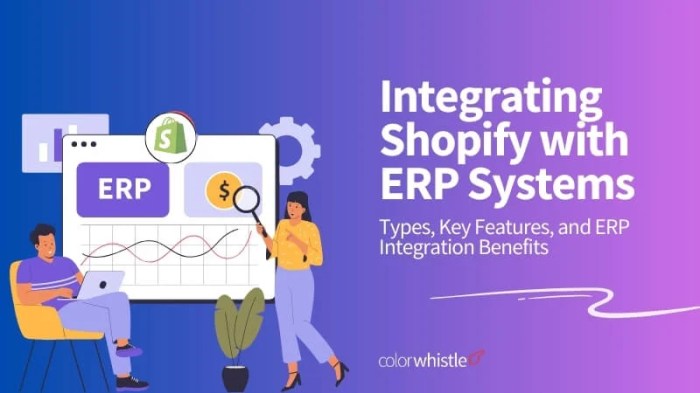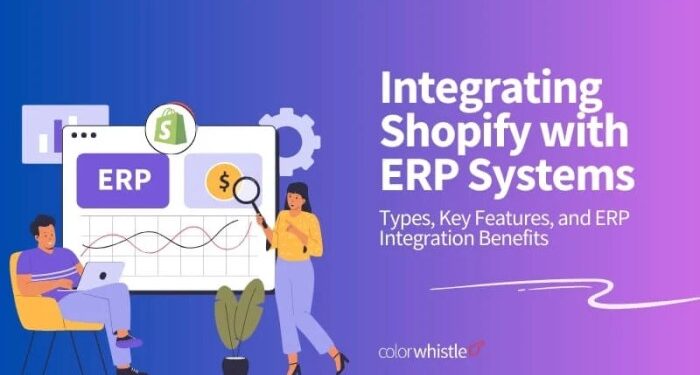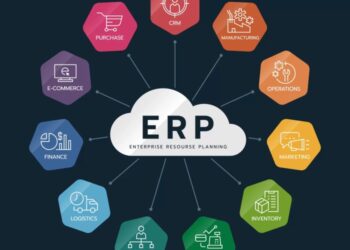Embark on a journey into the world of Shopify ERP integration, where e-commerce meets efficiency and growth. Discover how this seamless integration can revolutionize the way businesses operate, streamlining processes and maximizing potential.
Delve deeper into the key aspects of Shopify ERP integration and unlock a realm of possibilities for your online store.
Overview of Shopify ERP
Shopify ERP refers to the integration of Enterprise Resource Planning (ERP) systems with the Shopify e-commerce platform. This integration allows businesses to streamline their operations, improve efficiency, and enhance the overall customer experience.
By integrating ERP systems with Shopify, businesses can benefit from real-time data synchronization, automated processes, improved inventory management, and better decision-making capabilities. This integration helps businesses to manage their back-end processes more effectively, leading to increased productivity and profitability.
Popular ERP Systems Compatible with Shopify
- NetSuite: NetSuite offers a comprehensive ERP solution that integrates seamlessly with Shopify, providing businesses with a unified platform for managing their operations.
- SAP Business One: SAP Business One is another popular ERP system that can be integrated with Shopify to streamline processes and improve efficiency.
- Microsoft Dynamics 365: Microsoft Dynamics 365 offers a range of ERP solutions that can be customized to meet the specific needs of businesses using Shopify.
Features of Shopify ERP Integration
When integrating Shopify with an ERP system, several key features come into play to streamline operations and enhance efficiency.
Real-time Data Synchronization
One of the primary features of integrating Shopify with an ERP system is real-time data synchronization. This ensures that all information, including inventory levels, orders, and customer data, is updated instantaneously across both platforms.
Automation Capabilities
Before integrating ERP with Shopify, manual processes for order fulfillment, inventory management, and data entry were labor-intensive and prone to errors. However, after integration, automation capabilities significantly increase, reducing manual tasks and improving accuracy.
Implementation Process
Setting up ERP integration with Shopify involves several key steps to ensure a smooth transition and optimize your business processes.
Step 1: Planning and Preparation
Before starting the integration process, it is crucial to define your business requirements, set clear goals, and establish a timeline for implementation.
Step 2: Choose the Right ERP System
Select an ERP system that aligns with your business needs and integrates seamlessly with Shopify. Consider factors such as scalability, features, and support.
Step 3: Data Migration
Migrate your existing data from Shopify to the ERP system. Ensure that the data is clean, accurate, and consistent to avoid any issues during integration.
Step 4: Integration Setup
Work closely with your ERP provider to configure the integration settings, map data fields between Shopify and the ERP system, and test the connection thoroughly.
Step 5: Training and Testing
Train your team on using the integrated system effectively and conduct extensive testing to identify and resolve any issues before going live.
Step 6: Go Live and Monitor
Launch the ERP integration with Shopify and closely monitor the system performance, data accuracy, and overall functionality to ensure a successful implementation.
Common Challenges
- Lack of clear communication between stakeholders
- Data inconsistencies and errors during migration
- Resistance to change from employees
- Integration issues between ERP and Shopify
Best Practices
- Engage stakeholders early in the process and communicate regularly
- Conduct thorough data cleansing and validation before migration
- Provide comprehensive training to employees on the new system
- Regularly monitor and evaluate the integration for improvements
Customization and Scalability
When it comes to ERP integration on Shopify, businesses have the flexibility to customize the system according to their specific needs. This customization can involve tailoring workflows, fields, and processes within the ERP system to align with the unique requirements of the business.
This ensures that the integration not only meets the current needs of the business but also allows for future growth and adaptation.
Customization Options
- Customized reporting and analytics to track KPIs specific to the business
- Integration with existing software or systems to streamline operations
- Personalized workflows to improve efficiency and productivity
- Tailored dashboards for real-time insights and decision-making
Scalability for Growth
- As businesses expand, the ERP integration on Shopify can scale to accommodate increased data volume and complexity.
- Additional modules or functionalities can be added to the system to support new business processes or operations.
- Cloud-based ERP systems offer scalability by providing the resources needed as the business grows, without the need for significant infrastructure investment.
- Scalability also extends to the number of users and transactions the system can handle, ensuring smooth operations even during periods of high activity.
Successful Business Examples
- XYZ Company, a growing e-commerce retailer, successfully scaled their operations with customized ERP integration on Shopify, allowing them to efficiently manage inventory, orders, and customer data as they expanded.
- ABC Inc., a manufacturing company, utilized scalable ERP integration on Shopify to support their global growth, seamlessly connecting their production facilities, supply chain, and sales channels for improved efficiency and profitability.
- 123 Enterprises, a service-based business, leveraged customized ERP solutions on Shopify to tailor their project management, invoicing, and resource allocation processes, enabling them to grow and diversify their service offerings.
Final Thoughts

In conclusion, Shopify ERP integration offers a gateway to enhanced productivity, streamlined operations, and unparalleled scalability for businesses in the digital age. Embrace the future of e-commerce with this powerful fusion of technology and innovation.
FAQ
How can Shopify ERP integration benefit my business?
By integrating ERP systems with Shopify, businesses can streamline operations, improve efficiency, and enhance overall productivity.
What are some popular ERP systems compatible with Shopify?
Popular ERP systems that integrate well with Shopify include NetSuite, SAP Business One, and Microsoft Dynamics.
What challenges can businesses face during the implementation of Shopify ERP integration?
Common challenges include data migration issues, training employees on new systems, and ensuring seamless synchronization between platforms.
How can ERP integration be customized for different business needs on Shopify?
ERP integration can be customized by configuring specific modules, workflows, and data fields to align with the unique requirements of each business.
What scalability options are available for businesses with Shopify ERP integration?
Businesses can scale seamlessly by adding new features, modules, and integrations as they grow, ensuring that the system evolves with their expanding operations.








![Best Construction ERP Software [2024 Edition]](https://health.bandungnews.id/wp-content/uploads/2025/10/Top-10-Best-Construction-ERP-Software-to-Use-in-2024-1-120x86.jpg)



